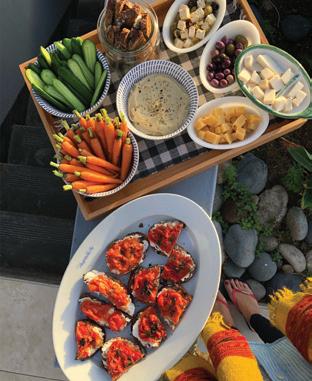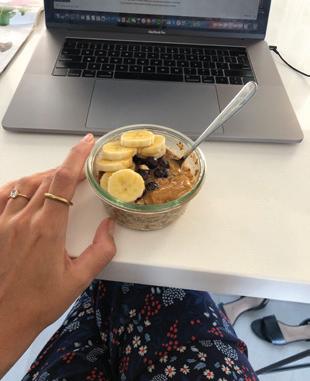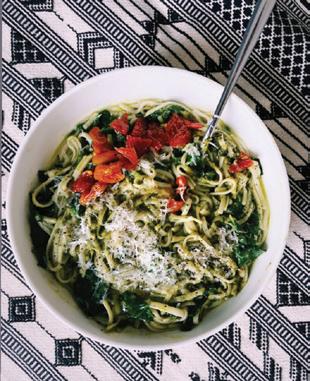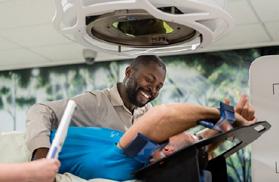
7 minute read
3 TIPS AND TRICKS TO EAT MORE WHOLE-FOOD PLANTS


3 TIPS AND TRICKS TO EAT MORE WHOLE-FOOD PLANTS IN 2020
(without necessarily going all-the-way vegan)
Arecord 400,000 people worldwide signed up to the Veganuary movement this year. While more and more people are switching to a 100% plant-based diet for its health and environmental benefits, it’s important to know that nutrition studies show conflicting findings about the health benefits of strictly quitting animal foods for good. We don’t have all the answers yet (nor do I have enough pages in this column to really get into all the details) but I will say that the vegan propaganda documentaries sprouting up like grains everywhere these days are best enjoyed with a hefty pinch of salt… Our dietary needs are constantly changing and at specific phases in our life we need different nutrients depending on our hormones, the season, our performance goals and our health history. Nutrient deficiencies are more common on vegan diets and careful planning is therefore needed. Here’s what science is not conflicted about: Increasing colourful plant food intake is beneficial for pretty much everyone. Veggies have come a long way since boiled broccoli and corn-filled squash, thankfully. In the mainstream culinary world vegetables have moved up from side dish status to lead role on the plate. Even the most finger-licking, rib-obsessed meat lovers have no beef with a meatless Monday every once in a while. Here are my 3 top tips for making veggies your new norm this year: Focus on the plant-based meals you already enjoy eating. I bet you can think of quite a few dishes you’ve always enjoyed which just happen to be all veg? Things like a good roasted tomato soup or creamy mashed avocado on crunchy homemade seed crackers, or a big colourful Mexican-style burrito bowl with sweet corn, black beans, guac, brown rice and salsa. Make a point of having your existing favourites more frequently and soon your palette (and your cooking repertoire) will adapt and expand in favour of more and more plants on the plate. Become one with beans, nuts and seeds. Beans are a great stand-in for meat in certain recipes, adding heartiness, texture and protein (I put a can of black beans and lentils in my bolognese, no one notices…). Use chickpeas in curries, black beans in chili and tacos, lentils in dal, you get the idea! Seek out less common varieties – there’s a whole world of beans out there waiting for you to discover them. Nuts and seeds are delicious in smoothies and breakfast jars. Evidence suggests that eating nuts and seeds daily can lower inflammation as well as your risk of diabetes and heart disease and could lengthen your life. Eating nuts five to six times a week was linked to a 15% reduction in risk of death, and seven or more times a week to a 20% reduction.
Pick a side of positivity with your produce. Even change that’s good for us can be hard. Often we respond to a dietary change with resistance or even childlike rebellion. We obsess over what we ‘have to give up’ instead of getting curious about all the new things we get to try out. Become aware of how you’re feeling every day (what’s different, if anything, about your energy levels, your sleep quality, your focus, weight, skin... what else?) Get creative in the kitchen and look for interesting new plants outside of your comfort zone (all the varieties of mushrooms, different types of beans, new ways to cook greens, herbs!, all of the world’s curries!) You’ve got this. It’s only food, get experimental. Let me know how it all goes - @bothsidesbuttered Find Klara on her offbeat Instagram feed (@bothsidesbuttered) where she distills the principles of optimal health down to their most foundational basics, ones that are accessible and easy for us all to follow. Klara is an Integrative Nutritionist and Health Coach with a BSc (Hons) degree from Middlesex University in the UK. She works with corporates and individuals to optimise wellbeing and boost productivity, and she regularly writes for a number of leading health and wellness publications and speaks at events about the physical effects of psychological stress. Here’s what science is not conflicted about: Increasing colourful plant food intake is beneficial for pretty much everyone.
Your muscles are burning, sweat stings your eyes, lungs are screaming for breath! But just when you think you can’t go any further, you turn the corner... and here comes the blissful freedom of coasting down the hill, reminding you of all the reasons you got on your bicycle again today. Thousands of cycling enthusiasts are once again descending on the Cape Peninsula, gearing up for another thrilling Cape Town Cycle Tour: one of the most scenic and well-loved events on the world road-cycling calendar. The health benefits of cycling are well documented, but cycling a significant distance in the summer heat can also take its toll on your body. To help you get the most out of your cycling experience, we’ve put together some of the best tips to help you start out right, enjoy every minute of your ride and recover fast and (relatively!) painlessly.
Before your ride: • Ensure your body is well-fuelled. Have a good-sized meal of easily digestible foods like scrambled eggs on whole-wheat toast, yoghurt with nuts, or some oats porridge. • Hydrate well. Staying hydrated helps you to digest your food and keeps your energy levels high. • Make sure you’ve got your whole kit – helmet, cycling shorts, sunglasses, cycling shoes, tool kit, etc., and check your bike to make sure it’s ready for the race, too. •
Don’t forget the cream! Chamois cream helps prevent saddle sores and reduce friction against your saddle. Sunblock is a must on all the areas of your body that are exposed to sunlight.
During your ride: • If you’re cycling long distances you need to keep replenishing your body’s reserves to ensure you don’t run out of steam. Keep a few energy gels or bars handy and sip fluids (water or a carbohydrate drink, depending on how much gels or bars you are consuming) frequently throughout your ride. • Enjoy the camaraderie, scenery and vibe while you’re out there!
After your ride: • Have a long, cool drink and a high protein meal to aid muscle recovery. • Invest in a post-race massage to wind down and help your muscles repair and your body recover quicker. • Keep moving! Don’t give in to the urge to lie down for the rest of the day. Rather walk around at regular intervals to keep stiffness and swelling in your legs at bay. • At the end of the day, make sure you get a good night’s rest. Sleep is our body’s number 1 repair mechanism.
Here’s to many enjoyable miles on the road – on and off the bike!

Health tips brought to you by The Namibian Oncology Centre


Care • Support • Hope
Our comprehensive service offerings include Clinical and Radiation Oncologists, a Paediatric Oncologist, Radiation therapy services, Chemotherapy services, a dedicated Oncology Pharmacy, Counselling services and an 11-bed cancer care ward including a specialised isolation unit.
Tel: +264 (0)83 330 5015 | info@namoncology.com 3 Heliodoor Street, Eros, Windhoek, Namibia www.namoncology.com
Beachcomber Mauritius for the


School Holiday’s Children Under 6 Stay FREE


Valid for travel 01 – 11 June 2020 (5 nights) 4 star Mauricia Beachcomber Resort & Spa
1 standard double + extra bed for a child under 6 years
4 star superior Victoria Beachcomber Resort & Spa 1 superior double (first floor) + extra bed for a child under 18 years
FROM N$ 18 700 per person sharing (pps)
www.trip.com.na
THE WINDHOEK
COLLECTION
The Windhoek Collection comprises Windhoek’s most popular eateries: The Stellenbosch Wine Bar & Bistro, The Stellenbosch Tasting Room and The Stellenbosch Market, as well as the self-catering Hillside Executive Accommodation apartments and the newest addition to the high-end accommodation market in the capital - The Windhoek Luxury Suites.
Suites










